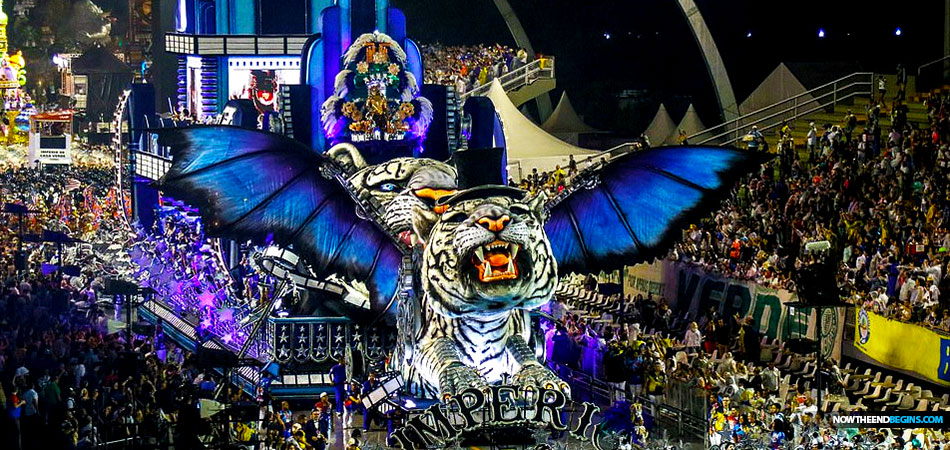
Carnival celebrations making the start of the Roman Catholic observance of Lent began across Brazil last night, with revellers swarming the streets in a sea of colour, glitter and feathers.
The Catholic Church in America is relatively conservative, at least outwardly, but all that changes when you go overseas. In many foreign countries Roman Catholicism is much more open about their pagan
Babylonian and Egyptian roots, where you will frequently encounter
Catholic occultism,
Catholic exorcisms, and
Catholic voodoo. In Brazil last night, they kicked off the start of Carnival which celebrates the Roman Catholic festival of Lent. As you can see from the main article photo, it is openly demonic and pagan.
"And the rest of the men which were not killed by these plagues yet repented not of the works of their hands, that they should not worship devils, and idols of gold, and silver, and brass, and stone, and of wood: which neither can see, nor hear, nor walk: Neither repented they of their murders, nor of their sorceries, nor of their fornication, nor of their thefts." Revelation 9:20,21 (KJV)
The Catholic Church instituted Lent as a special time of prayer, penance, sacrifice and good works
in preparation of the celebration of Easter. The word Lent itself is derived from the Anglo-Saxon words lencten, meaning "Spring," and lenctentid, which literally means not only "Springtide" but also was the word for "March," the month in which the majority of Lent falls. Laodicean non-Catholic churches like
the United Methodists also celebrate Lent. The origins of Lent go all the way back to the
start of the Roman Catholic Church in 313 AD.
When you watch how the Catholics in Brazil celebrate their pre-Lent Carnival, to me it's like what I imagine the
One World religion under Antichrist will look like. Now, of course, Catholics will write in to say that these people in Brazil are not "true Catholics', and that this pagan festival does not represent the global Catholic Church. Well, if that were true, why is not the pope denouncing it for the end times mess that it is? The Vatican must have no problem with it because they have never rebuked Brazil for doing it over the last nearly 200 years.
Brazilian party-goers turn Sao Paulo into sea of colour, glitter and feathers on first night of five-day festival to mark start of Lent
FROM THE DAILY MAIL UK: Party-goers showed off their opulent costumes in Sao Paulo and Rio de Janeiro during the first night of celebrations for the five-day festival which marks the start of Lent.
This year's event is the first such celebration since Jair Bolsonaro took office, and it is expected that the festival will target the far-right president known for
offending the LGBT community and minorities.
At Carmelitas, one of Rio's most traditional street parties, revelers sang along to a samba song titled: 'Blue or pink, it's all the same,' a reference to Bolsonaro's human rights minister, Damares Alves, who declared: 'It's a new era in Brazil, boys wear blue and girls wear pink,' soon after she took up her post.
'This parade is an act of resistance to the oppressive new government,' said Monica Machado, a percussion player in the band.
The song's lyrics went, 'On the train of history, we can't go in reverse,' a reference to the Brazilian president's open admiration of Brazil's 1964-1985 military dictatorship.
Bolsonaro has famously said he would rather
have a dead son than a gay son and that police who kill criminals should be given medals not prison sentences. Several party-goers' costumes targeted an early corruption scandal in the Bolsonaro government.
Carnival began in the 1830s as a continuation of the Portuguese tradition of celebrating and indulging on the day before Lent begins. Lent is the 46-day period observed primarily by Roman Catholics as a means of sacrifice and abstinence in preparation for Easter. During the late 1800s, street musicians and dancing were introduced in Rio de Janeiro's Carnival, in addition to themed costumes and the tradition of electing the Carnival's "king." The celebration includes live music, street performances, dancing, floats, costumes, food and beverages. Rio de Janeiro has one of the most well-known Carnival celebrations.
source
Vinicius Alves, a university student, wore all orange with a headband adorned with fake money and orange slices, a nod to the Brazilian expression 'orange employee,' which refers to politicians' use of ghost employees to launder money.
Rio's evangelical bishop-turned-mayor, Marcelo Crivella, came under fire on the party's first day for skirting his duty to kick off the celebrations by handing over the key of the city to the king of Carnival for the third consecutive year.
He told reporters that he would be turning in the keys to Carnival, not the keys to the city as is tradition.
'It's very disrespectful. I'm trying to understand why they wouldn't want to participate in this ceremony,' said Mauricio de Jesus, the president of the cultural center where the key is held.
The evangelical Crivella has made negative comments about African-rooted religions, which many Brazilians practice and have great cultural influence on Carnival celebrations. 'This is disrespectful to the black population, to the black community, to our roots,' de Jesus said.
READ MORE
Rio Carnival 2017
GRAPHIC WARNING: There is much in this video of Carnival from Brazil that you might find offensive. That said, you will easily see the New Age and pagan influences that the Catholics in Brazil display as they prepare for Lent.
No comments:
Post a Comment